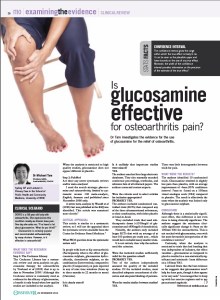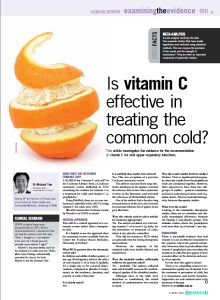This article was published in Medical Observer. The article is also available on the Medical Observer website (may need registration).
Tag: CAM
May 14 2012
Monday’s medical myths: vitamin C prevents colds
The following article was published on The Conversation. Monday’s medical myth: vitamin C prevents colds By Michael Tam, University of New South Wales Vitamin C is so often suggested as a treatment for the common cold that it’s almost considered common sense. This well-known vitamin is primarily found in fruits and vegetables, with small quantities …
Apr 13 2012
Is vitamin C effective in treating the common cold?
This article was published in Medical Observer. The article is also available on the Medical Observer website (may need registration).
Mar 21 2012
Comment: Response to “Tarring complementary medicine is anti-choice”
The following is a comment to an opinion piece, “Tarring complementary medicine is anti-choice” written by Kerryn Phelps in Medical Observer. My comments were published online on 21 March 2012. I concur with some of the statements in the comments and feel I must support my colleagues who are members of the Friends of Science in …
Mar 15 2012
Comment: Homoeopathy, ethics and controversy
Comment to the article “Homeopathy isn’t unethical, it’s just controversial” by Jon Wardle, published in The Conversation. To be frank, it is really quite simple. Homoeopathy isn’t “controversial”. It does not work. There is no good empiric evidence that it does, plenty of empiric evidence that it doesn’t, and entirely lacks scientific plausibility. There is a …



Mar 23 2012
Comment: EBM vs CAM
Comment to the article, “Evidence-based medicine v alternative therapies: moving beyond virulence” by Kerreen Reiger, published in The Conversation: Health claims are empiric claims. They can be tested using empiric methods. Scientific frameworks allow use to gauge the reliability of evidence. For example, the narrative claim from an individual that they were helped by chiropractic is …
Continue reading